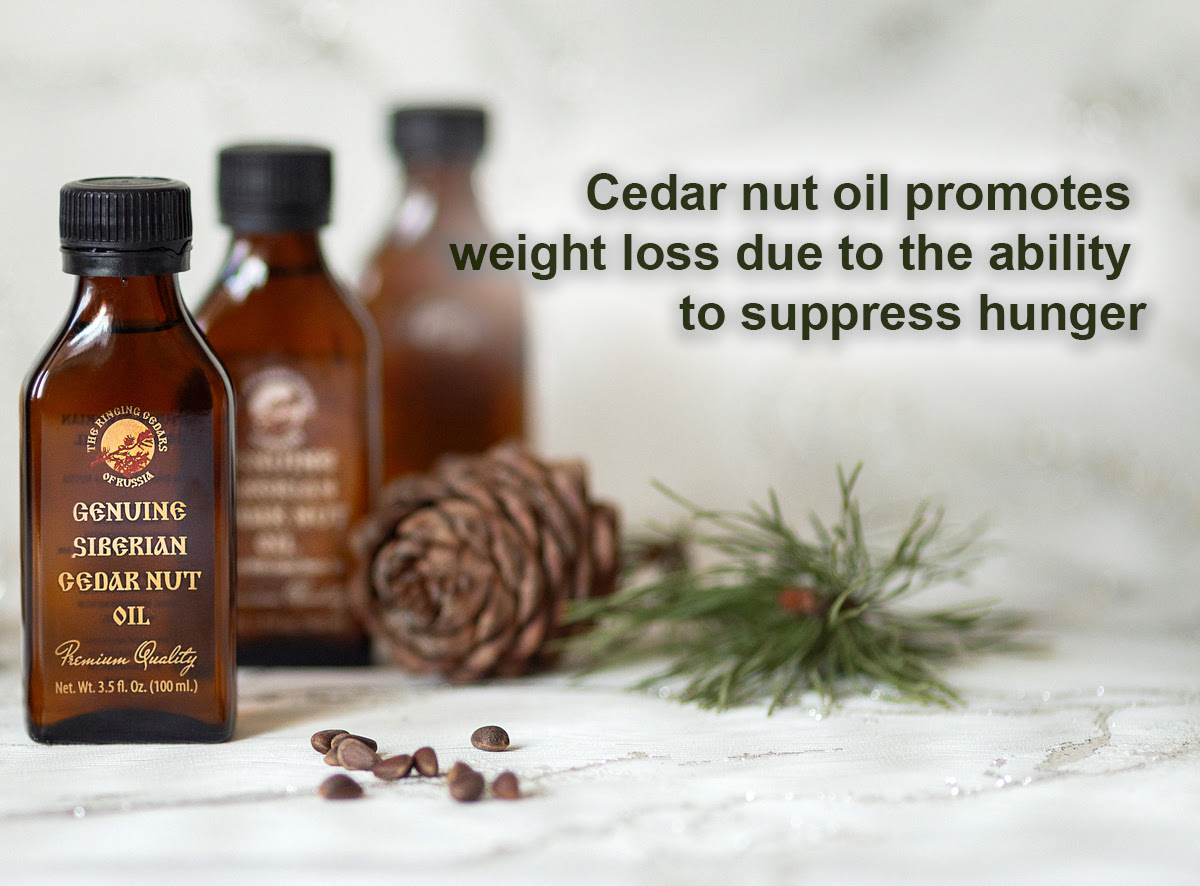
Cedar nut oil helps with weight loss due to a number of its properties: it promotes the burning of visceral fat, promotes the elimination of harmful substances, and reduces appetite. All these properties have been repeatedly studied by scientists. Today we want to tell you about two recent studies: scientists from the UK have shown that special fatty acids (NMIFA) from cedar nut oil reduce energy intake from food. At the same time, an experiment conducted by Danish researchers showed that pine nut oil affects the secretion of glucagon-like peptide-1 (GLP-1), thereby reducing the subjective feeling of hunger.
NMIFA from cedar nut oil increases energy expenditure while lowering energy consumption
The first study was conducted in 2021 by the School of Human Development and Health (University of Southampton).[1] The scientists drew attention to the fact that cedar nut oil is rich in rare delta-5-uninterrupted methylene fatty acids (NMIFA), including pinolenic acid (PLA). In the human body, PLA is metabolized to eicosatrienoic acid (ETA). Cedar nut oil is also rich in another NMIFA, sciaonic acid that has similar effects. To substantiate the beneficial effects of cedar nut oil on human health, scientists analyzed the current literature on PLA, ETA, and sciadonic acid.
Among the main effects of acids that have already collected a sufficient evidence base, scientists have identified:
- improvement of blood and liver lipid levels
- improvement of insulin sensitivity
- modulation of immune function
- reducing inflammation.
Of greatest interest to the authors of the study was the proven ability of cedar nut oil to influence body weight and fat deposition due to a double effect. First, the acids in the oil increase energy consumption through the oxidation process. Secondly, they speed up the process of saturation, thereby reduces energy intake from food. Thus, scientists came to the conclusion that cedar nut oil can be used as part of diets to reduce body weight. They also emphasized that further experiments are needed to study the properties of the oil.
Cedar nut oil affects the secretion of glucagon-like peptide-1 (GLP-1)
Another study on the effect of cedar nut oil on appetite was conducted in 2021 by a team of Danish scientists from Odense University Hospital, the University of Southern Denmark, and the University of Copenhagen.[2] Their task was to determine the potential effects of the oil on GLP-1 secretion, glucose tolerance, insulin secretion, and appetite when delivered to the small intestine.
How are these indicators related to each other? GLP-1 is a peptide that is produced in the intestines in response to food intake. It affects many organs: the stomach, the pancreas, central nervous system, and a number of others. GLP-1 triggers a complex process that leads to satiety when enough energy is available to the body. Reduced glucose tolerance and impaired insulin secretion are the first signs of metabolic disorders that affect the subjective feeling of hunger. It can lead to obesity and various complications, such as type 2 diabetes mellitus.
Danish scientists recruited 9 overweight subjects and examined how cedar nut oil intake affects GLP-1 secretion, glucose levels, insulin levels, and subjective appetite. It was found that the use of cedar nut oil increases the secretion of GLP-1 in the period from 0 to 360 minutes, suppresses subjective appetite by reducing the feeling of hunger and expected food intake, as well as increasing the feeling of satiety. The scientists also tested the effects of cedar nut oil used in combination with olive oil, but found that the combination did not increase GLP-1 secretion. It was concluded that the consumption of cedar nut oil has a positive effect on body weight due to a decrease in appetite.
Thus, cedar nut oil can become your assistant during the diet. Thanks to its properties, you are satiated faster and eat less food.
REFERENCES:
[1] Baker EJ, Miles EA, Calder PC. A review of the functional effects of pine nut oil, pinolenic acid and its derivative eicosatrienoic acid and their potential health benefits.
[2] Sørensen KV, Kaspersen MH, Ekberg JH, Bauer-Brandl A, Ulven T, Højlund K. Effects of Delayed-Release Olive Oil and Hydrolyzed Pine Nut Oil on Glucose Tolerance, Incretin Secretion and Appetite in Humans.





